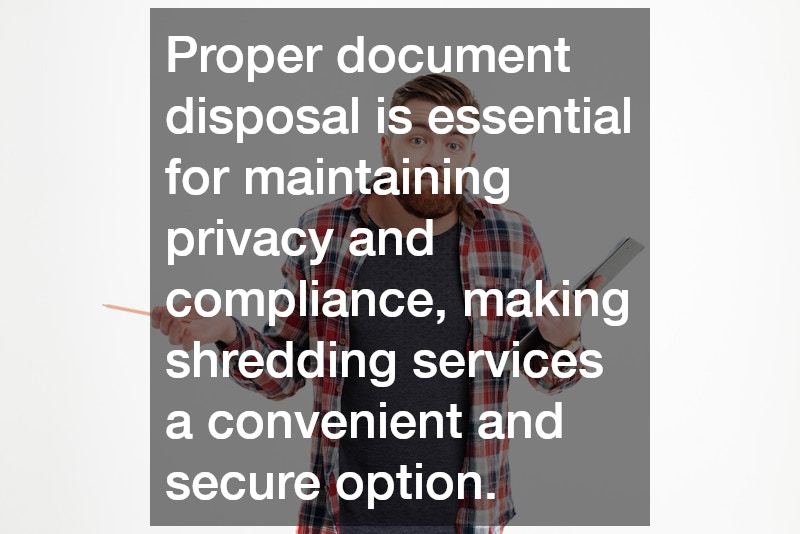
Proper document disposal is essential for maintaining privacy and compliance, making shredding services a convenient and secure option. These services ensure that your sensitive information is destroyed safely, protecting you from identity theft or data breaches. For short-term needs, you can rent a paper shredder, which is ideal for small-scale projects or one-time uses. This cost-effective option allows you to handle document destruction on-site while maintaining control over your confidential information.

Handling confidential papers requires special care. Whether it’s financial records, legal documents, or personal files, professional shredding services use advanced techniques to ensure secure disposal. Many companies also provide a certificate of destruction, offering peace of mind that your documents were handled appropriately. Understanding the cost of shredding is an important factor when choosing a service. Pricing often depends on the volume of documents, whether you opt for drop-off or on-site shredding, and any additional services like recycling or secure storage.

Comparing local providers ensures you find an option that fits your budget and needs. For businesses, legal shredding is crucial to comply with regulations such as HIPAA, FACTA, or GDPR. Partnering with a reliable shredding company ensures proper disposal methods, safeguarding sensitive data, and avoiding potential legal penalties.

As much as some may want to shift all information online, the fact is that this isn’t happening anytime soon. There’s a reason why we still keep a lot of information paper. One form of storage doesn’t preclude the other — many people like to keep “soft” copies of their records on computers, and “hard” copies on paper elsewhere. Lots of people need hard copies of information to verify its authenticity, and certain contracts still need to be signed by hand in order to be validated. With that being said, as much as paper is unavoidable, there are risks associated with keeping a paper trail too long. Another issue that comes up in regards to paper records isn’t so much the fact that they’re paper, but that there are too many copies in the first place. This can lead to a number of problems. Large amounts of paper can be difficult to dispose of at once, and for that matter rather environmentally unfriendly. However, if that paper isn’t disposed of, it can be stolen or misplaced. In fact, even if the paper has been disposed of, if it’s left in its solid form it could be retrieved. This is why many companies in particular have turned to secure shredding services in recent years. Paper shredding services ensure that privacies are protected, and documents are easier to dispose of.
How Does Paper Shredding Relate To Identity Theft?
So — what happens if companies don’t use paper shredding services? There are two options: either documents that can be disposed of are simply stored permanently, left to take up space, or they are disposed of intact. Either way, these documents can be stolen. Although a lot of us associate identity theft with the Internet in this day and age, less than 10% of identity theft cases are represented by online exchanged. Often, documents that should have been shredded contain information relating to people’s privacy, and when this information is stolen, lives can be severely disrupted. Of course, identity theft at the workplace often happens because business information is being stolen — so it’s not only the employees’ personal information that’s at risk here, but company secrets as well. Again, even if documents are being thrown away, if they are left intact they can easily be stolen. Therefore, onsite document shredding has become the norm at many workplaces. With about 95% of businesses still storing information on paper, this should be a practice adopted by all.
Does Paper Shredding Improve The Workplace?
Paper shredding may seem tedious, but it’s an important part of keeping a safe, healthy workplace. As previously mentioned, if documents aren’t being disposed of, they’re going to be kept in the office. This will take up a lot of space, and often contribute to messiness as well. A major issue with any workplace that keeps a large amount of paper products is the risk of fire. By shredding paper rather than storing it, offices are able to cut down on that risk while at the same time cutting down on the amount of space that paper is taking up. Shredded paper is much easier to dispose of than intact documents, for that matter. Some paper shredding services dispose of the shredded paper for their clients, and will even recycle it if requested. Yes — in fact, shredded paper has environmental benefits as well. The easier paper is to recycle, the more it will benefit the environment in the long term; and shredded paper is much easier to recycle than intact documents.
What Should We Do Before Shredding Paper?
While it’s smart to use paper shredding services, you should still have backup copies of whatever you’re shredding. Rather than make new hard copies, however, you should scan the documents prior to shredding them. This will allow you to keep soft copies of important information, while getting rid of your excess hard copies. Thus, you free up space while keeping the information you need.


